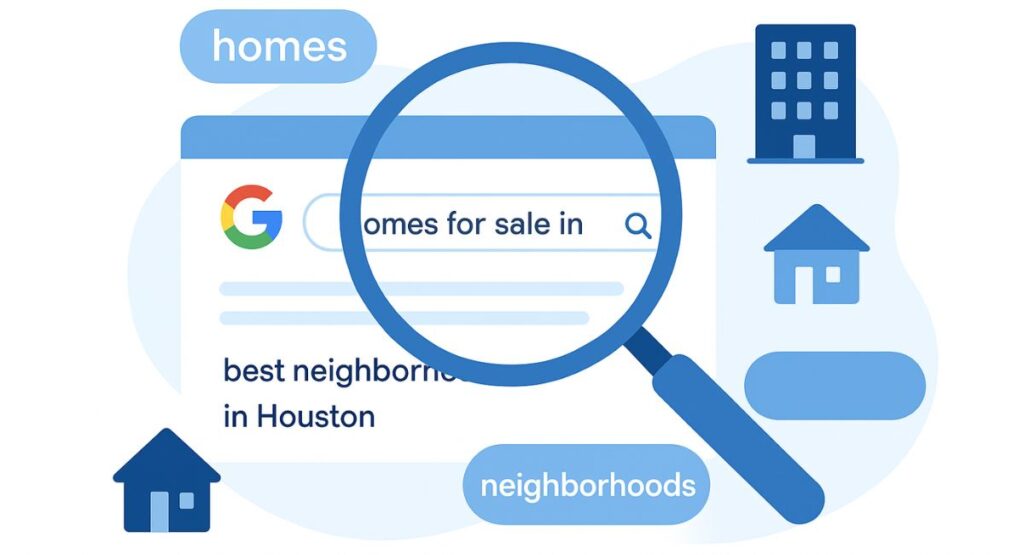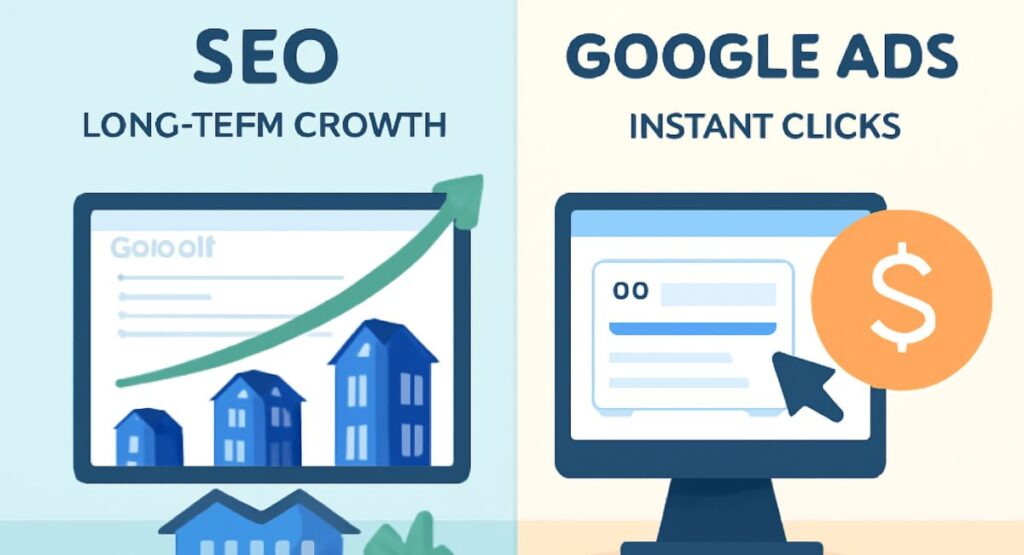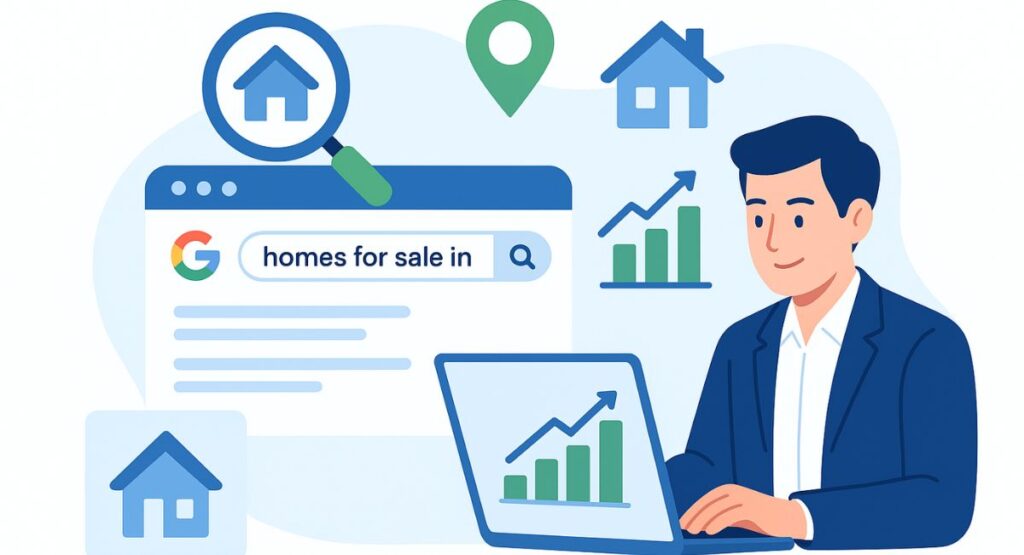When you’re in the business of selling homes, location isn’t the only thing that matters. Online visibility is just as important. In today’s digital world, SEO for real estate is the secret weapon that separates successful agents and investors from the rest.
Whether you’re a solo agent in Austin or a real estate investing firm in Dallas, SEO can drive steady, high-quality leads — without paying for ads.
Let’s break it all down in plain, easy-to-follow steps — with real-world examples and tools to get you started today.
- SEO for Real Estate Example: A Story From the Trenches
- What Are Real Estate SEO Keywords?
- Best SEO for Real Estate: What Actually Works
- Free SEO for Real Estate: Budget-Friendly Tools
- SEO for Real Estate Investors: What You Need to Know
- SEO vs PPC for Real Estate Investors: Which Is Better?
- Local SEO for Real Estate Agents: Be Seen in Your City
- Pro Tips From the Best SEO Company for Real Estate
- Summary: Your Next Steps for Winning With SEO
- Final Thoughts
SEO for Real Estate Example: A Story From the Trenches
Meet Sarah, a real estate agent in Tucson, AZ. She had a beautiful website but zero traffic. After adding local keywords like “homes for sale in Tucson AZ” and writing blog posts about the best neighborhoods, she saw a 300% increase in visitors — all without paying a dime for ads.
This is the power of local SEO for real estate.
What Are Real Estate SEO Keywords?

Keywords are the words people type into Google. For real estate, these include phrases like:
- Best SEO keywords for real estate agents
- Homes for sale in [your city]
- Real estate investment properties in [location]
Use tools like Google Keyword Planner or Ahrefs to find keywords people are searching for in your area.
Focus on long-tail keywords like “best neighborhoods to invest in Houston” rather than broad ones like “real estate.”
Best SEO for Real Estate: What Actually Works
Here’s your step-by-step guide to the best SEO strategy for real estate:
- Do Local Keyword Research
Use tools like Ubersuggest to find real estate keywords for SEO in your market. - Optimize Your Website
Use SEO for real estate website best practices like:
- Clean URLs (e.g., yoursite.com/homes-in-dallas)
- Fast load times
- Mobile responsiveness
- Start a Blog
Write about topics like:
- “Best neighborhoods in Austin for first-time buyers”
- “How to buy investment property in Las Vegas”
- Use On-Page SEO
Add keywords in:- Title tags
- Meta descriptions
- Header tags
- Image alt text
- Get Backlinks
Reach out to local blogs or business directories. Backlinks help boost your domain authority. - Track Your Progress
Use Google Analytics and Google Search Console to track rankings and clicks.
Free SEO for Real Estate: Budget-Friendly Tools
You don’t need to break the bank to do SEO. Here are some free SEO for real estate tools to get started:
- Yoast SEO: For WordPress users
- Google Search Console
- Answer the Public: Great for blog topic ideas
- Screaming Frog SEO Spider: For technical SEO audits
SEO for Real Estate Investors: What You Need to Know
Whether you’re in Las Vegas, Houston, Austin, or Dallas, SEO for real estate investors helps you get leads for off-market deals.
Here’s what works:
- Focus on keywords like “sell my house fast in [city]“
- Create landing pages targeting different cities (e.g., “SEO for real estate investors Tucson AZ“)
- Use schema markup to improve local results
Check out this guide on SEO for investors from garage2global, a platform designed for real estate investors.
Also, read SEO for real estate investors reviews to find top-rated tools and services other investors love.
SEO vs PPC for Real Estate Investors: Which Is Better?

- SEO is long-term. It takes time but brings consistent, organic traffic.
- PPC (like Google Ads) brings instant traffic but stops when you stop paying.
Most successful investors use both — but if your budget is tight, start with free SEO tools and scale up.
Compare SEO vs PPC here.
Local SEO for Real Estate Agents: Be Seen in Your City

Local SEO for real estate agents is all about being found on Google Maps and “near me” searches.
Here’s how to dominate local search:
- Claim your Google Business Profile
Set up here - Add local content
Talk about local events, news, and real estate trends in your blog. - Get reviews
Ask happy clients to leave Google reviews — they boost local trust and rankings. - NAP consistency
Make sure your Name, Address, and Phone number match across directories.
Pro Tips From the Best SEO Company for Real Estate
Top-performing agents often work with an SEO agency for real estate agents to take things further. If you’re ready to scale, look for firms offering:
- SEO services for real estate industry
- Technical SEO audits
- Backlink strategies
- Lead-gen landing pages
Want to DIY first? Try this free SEO checklist.
Summary: Your Next Steps for Winning With SEO
- Start with keyword research
- Optimize your real estate website
- Write helpful, local content regularly
- Build backlinks and get reviews
- Track and tweak your strategy monthly
Done right, SEO for real estate can drive quality leads, reduce ad spend, and position you as the go-to expert in your market.
Final Thoughts
Mastering SEO for real estate isn’t just a luxury anymore — it’s a necessity. Whether you’re a solo agent in a small town or an investor in a big city like Dallas, TX or Houston, TX, the right SEO strategy can elevate your visibility, attract high-intent leads, and build long-term credibility online.
The best part? You don’t need a massive budget to start. With the right mix of local SEO for real estate, targeted content, and consistent effort, you can grow your business organically — without relying solely on expensive ads.
Remember, SEO is a marathon, not a sprint. Results don’t happen overnight, but they compound over time. Start small, stay consistent, and keep optimizing as you go.
If you’re feeling overwhelmed, consider partnering with a trusted SEO agency for real estate agents or exploring SEO services for real estate investors tailored to your market.
So, whether you’re focused on SEO for real estate investing, launching a new real estate website, or refining your existing strategy — now is the time to act.
Your future leads are already searching. Make sure they find you — first.
